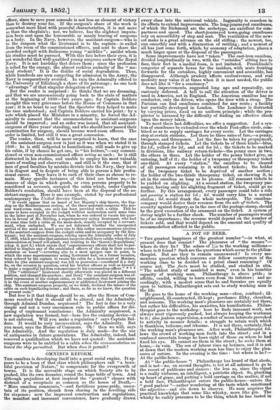OMNIBUS REFORM.
THE omnibus is developing itself into a great social engine. It ap- pears to be a boon of that class which philosophers call "a beau- tiful provision of Nature," to compensate for the overgrowth of towns. It is the moveable stage on which Society sits to be pushed, like its own decanter, round the huge table of town. And although prejudices at first inspired the " genteel " classes with distrust of a receptacle as common as the house of Death,— "Mors omnibus communis,"—and fastidious purse-pride, uncer- tain of its position, shrank from sharing in the levelling ride for sixpence; now the improved construction and ztions, the manifest and incessant convenience, have grade y drawn every class into the universal vehicle. Ingenuity is ceaseless in its efforts to extend improvements. The long-journeyed omnibuses, of which the Richmond are the archetype, are excellent for com- pactness and speed. The short-journeyed town-going omnibuses rely on accessibility of step and seat The ventilation of the new- est make is a great advance on the old stiffing ; the newest, too, run smoothly and with a diminution of rattling ; and a newest of all has just come forth, which, by economy of adaptation, places a much larger space at the disposal of the passengers. Some improvements have not " taken.' The cast-iron omnibus, divided longitudinally in two, with the "outsides" sittingface to face, their feet in a medial fosse' is not imitated. Fran •
congeries of separate boxes for the insiders, with seats fronting forwards for the outsiders, highly convenient and accessible, has disappeared. Although prudery affects exclusiveness, and real modesty may value it at times when it is most needed, the public does not like it " for a constancy."
Some improvements, suggested long ago and repeatedly, are curiously, deferred. A bell to call the attention of the driver is used in America, not in England. The American omnibus has no conductor, only the driver, who opens the door with a strap. The Parisian can find omnibuses combined for any route ; a facility but partially developed in London. The Londoner is distracted by varying prices, fixed on no uniform principle ; while the pro- prietor is harassed by the difficulty of finding an effective check upon the money taken. To meet these last difficulties, we offer a suggestion. Let a sys- tem of omnibuses be extended over the whole Post-office circle, com- bined so as to supply carriages for every route. Let the carriages stop at certain stations. Let there be three rates of fare,—a penny, twopence, and threepence. Let the fare be taken by prepayment, through stamped tickets. Let the tickets be of three kinds—blue, for ld., yellow for 2d., and red for 3d. • the tickets to be marked in divisions, like railway return-tickets—the penny ones in two, the others in three. Let the holder of the penny ticket give, on entering, half of it; the holder of a twopenny or threepenny ticket one-third. At every " station," the omnibus to be cleared of all passengers remaining in it without tickets; the holder of the twopenny ticket to be deprived of another section ; the holder of the two-thirds threepenny ticket, on showing it, to sit in the omnibus as long as he pleases. All remnant tickets to be yielded on alighting. At a second station, the twopenny pas- senger, having only his alighting fragment of ticket, could go no further. By this arrangement, every passenger could take a ride not passing a station for ld.; 2d. would carry him to a second station ; 3d. would frank the whole metropolis. The omnibus- company would derive their revenue from the sale of tickets. The security against forgery, as in the case of the postage-stamp, should be the good execution of the ornament on the ticket. A system of dating might be a farther check. The number of passengers would be of no importance ; the revenue would depend on the number of tickets sold, and that would depend on the amount and quality of accommodation afforded to the public.


































 Previous page
Previous page